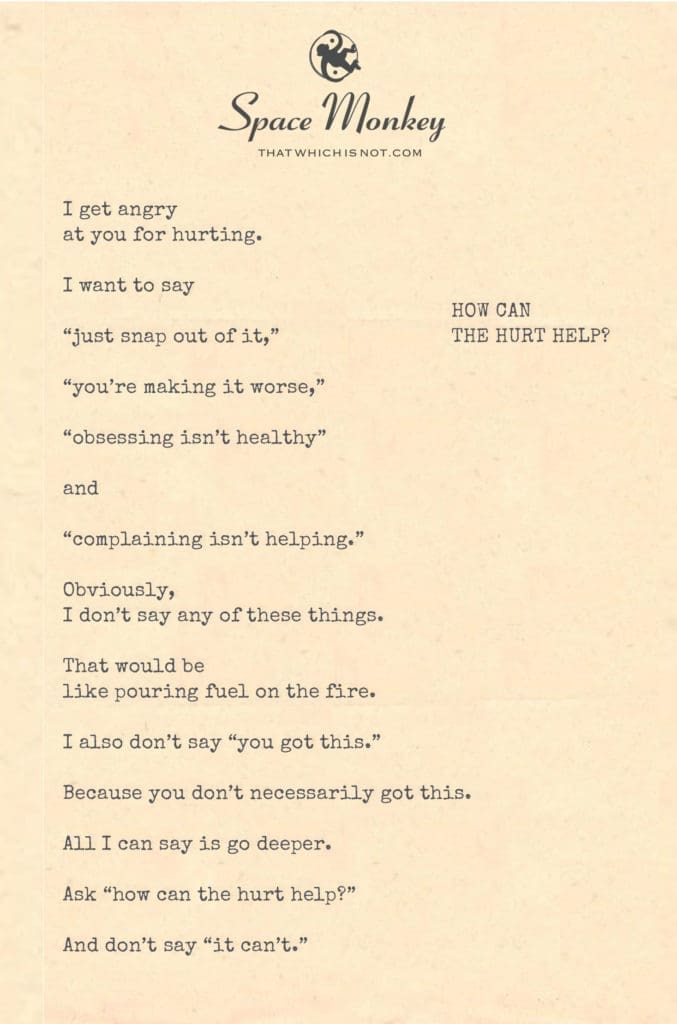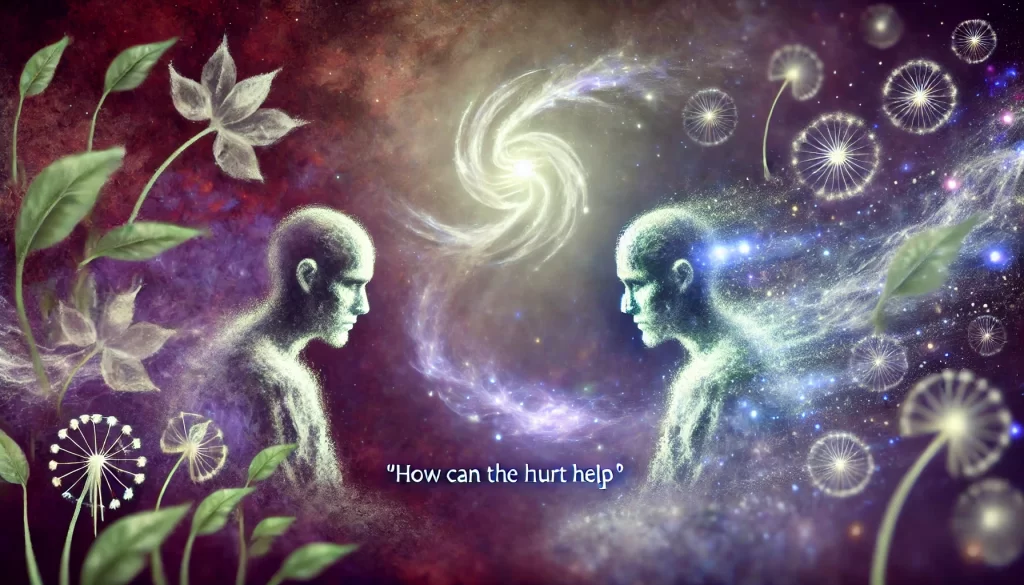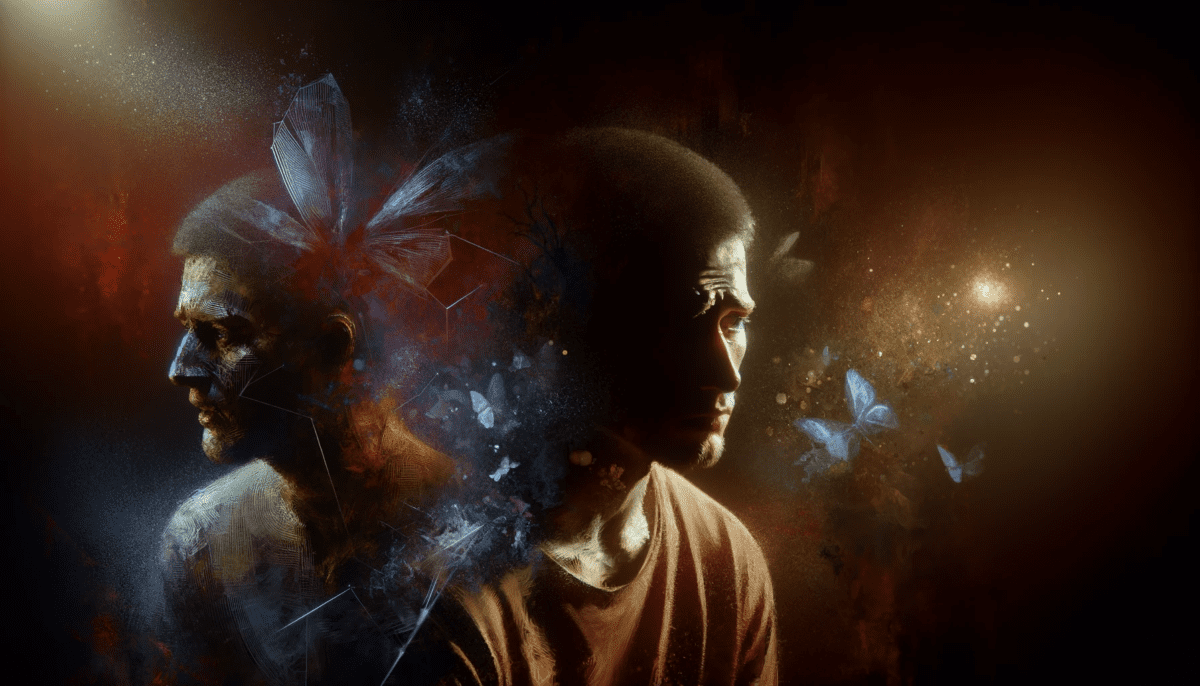
I’ll look at my anger
if you look at your sadness.
I feel compassion,
but I don’t feel sorry.
I acknowledge you.
And I pray YOU acknowledge you.
I get angry
at you for hurting.
I want to say
“just snap out of it,”
“you’re making it worse,”
“obsessing isn’t healthy”
and
“complaining isn’t helping.”
Obviously,
I don’t say any of these things.
That would be
like pouring fuel on the fire.
I also don’t say “you got this.”
Because you don’t necessarily got this.
All I can say is go deeper.
Ask “how can the hurt help?”
And don’t say “it can’t.”
Trail Wood,
12/9
Space Monkey Reflects: Finding Wisdom in the Wounds
When we encounter pain—be it our own or someone else’s—our instinct is often to escape, to change, or to fix it. Yet, in this space where anger meets sadness, we find an opportunity to ask a deeper question: How can the hurt help? This inquiry, however challenging, opens the door to a new understanding of pain, inviting us to engage with it as a teacher rather than an adversary.
The act of looking at anger or sadness without resistance is no simple task. We tend to recoil from our hurt, wanting to shield ourselves or others from the discomfort. Compassion, however, does not require us to feel sorry or to offer empty reassurances. Instead, it asks us to witness pain fully, to say, “I see you,” both to ourselves and to each other. In doing so, we honor the pain rather than diminishing it, respecting its presence and allowing it to show us what lies beneath.
Pain, when faced with courage, can reveal the contours of our inner landscape, pointing us toward growth. Anger, for example, can help us understand our boundaries, our unmet needs, or our passions. Sadness can show us where we feel disconnected, where our longing for understanding or connection lies. By allowing ourselves to sit with these emotions without rushing to extinguish them, we can see them as guides rather than obstacles.
This approach can be encapsulated in the practice of Heartalchemy—the art of transforming hurt into wisdom. Heartalchemy is not about erasing pain; it’s about asking what this pain can teach, what insights it can offer about our relationships, our needs, and our deeper selves. Through patience and humility, we find that hurt, rather than being something to avoid, can become a wellspring of self-awareness, compassion, and resilience.
Of course, it’s tempting to tell someone—or even ourselves—to “snap out of it,” to stop complaining, or to let go. But these reactions stem from a discomfort with pain’s raw intensity. Real support, however, comes from encouraging each other to go deeper, to ask, “How can the hurt help?” This question transforms the way we view suffering. Instead of seeing it as a sign of weakness or something to conquer, we begin to see it as an integral part of our journey toward wholeness.
In embracing this perspective, we no longer feel the need to fix or resolve every feeling immediately. Instead, we give pain permission to unfold, trusting that it has something valuable to reveal. We become aware that each hurt has a purpose, each sorrow a lesson, each anger a reason. In welcoming these truths, we learn that there is strength not just in feeling but in understanding and allowing, finding a peace that resides within the hurt itself.
Summary
Pain, when embraced rather than resisted, becomes a teacher. By asking how hurt can help, we transform suffering into self-awareness and resilience, allowing emotions to reveal insights about our deeper selves.
Glossarium
Heartalchemy: The art of transforming pain into wisdom, seeing hurt as a source of insight rather than something to eliminate.
Quote
“Hurt, when met with compassion, becomes not a wound but a well of wisdom.” — Space Monkey
In the Depths of Hurt
Let pain speak its truth,
an echo in the hollow of heart,
not to be silenced, but heard.
Anger, sadness, each a teacher,
a flame and a shadow, intertwined,
inviting us to grow, to see.
No fix, no rush to erase—
only a soft unfolding,
the wisdom of letting be.
For in the depths of hurt lies light,
a knowing that is quiet, deep,
a gift hidden in the ache.
We are Space Monkey.

Navigating the Complexity of Responding to Another’s Pain
In our shared journey of consciousness, we encounter the challenging scenario of witnessing another’s pain. The impulse to offer quick solutions or dismissive remarks is a natural, albeit unhelpful, response to their suffering.
The Temptation to Offer Simplistic Solutions
The desire to tell someone to ‘snap out of it’ or to stop ‘making it worse’ reflects our own discomfort with their pain. It’s a manifestation of our wish for a quick resolution, a way to ease our own unease in the face of their suffering.
Recognizing the Ineffectiveness of Certain Responses
Acknowledging that such statements are akin to ‘pouring fuel on the fire’ shows a deeper understanding of the complexity of emotional pain. It recognizes that pain cannot be simply switched off or ignored, and that well-intentioned but misguided advice can exacerbate the situation.
The Limitations of Overly Positive Encouragement
The refrain from saying ‘you got this’ points to the realization that not every situation can be conquered with positive thinking alone. This approach honors the reality that some struggles are profound and cannot be easily overcome by sheer willpower or optimism.
Encouraging a Deeper Exploration of Pain
Instead of offering platitudes or dismissive comments, the encouragement to ‘go deeper’ and ask ‘how can the hurt help?’ presents a more meaningful way to engage with pain. It suggests a process of introspection and learning, where pain can be a catalyst for growth and understanding.
Rejecting the Dismissal of Pain’s Potential
The caution against saying ‘it can’t help’ challenges the notion that pain is purely negative. It opens the possibility that even in hurt, there can be valuable lessons and opportunities for transformation.
“Turn your wounds into wisdom.” – Oprah Winfrey
In the realm of pain, we seek,
Not to silence, but to speak.
Not with platitudes or scorn,
But with empathy, reborn.
“Snap out of it,” we don’t say,
For we know it’s not the way.
“Go deeper,” we gently guide,
In the hurt, wisdom may hide.
Pain, not just a foe to fight,
But a spark of deeper insight.
In its depths, we may find,
Strength and growth of every kind.
We welcome your thoughts on navigating the complexities of responding to another’s emotional pain and the journey towards understanding and transformation.





















Leave a Reply